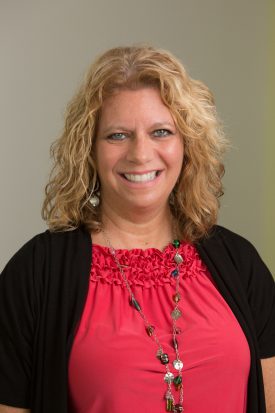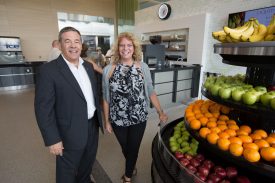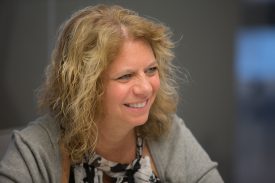
Peggy Policastro
Fortunate is the person who can parlay a childhood fascination into an academic and professional career. Peggy Policastro is a fortunate person.
Peggy, a registered dietician, is the nutritionist for Rutgers Dining Services, and the director of behavioral nutrition with the Institute for Food, Nutrition, and Health (IFNH). She also holds a master’s degree in nutritional science from Rutgers and what she describes as a first-of-its-kind Ph.D. in interdisciplinary studies-nutritional science and psychology.
The interdisciplinary doctorate is a relatively new concept for the Graduate School-New Brunswick that requires the aspiring doctoral candidate to devise a course of studies and to get approval from the authorities of each academic program or department involved in the curriculum.
Why go through all the effort? In Peggy’s case it was because of her intense curiosity about not only what people eat, but also why they eat what they eat.
As part of her work, she directs the Rutgers Healthy Dining Team and the IFNH Student Ambassadors, teams of undergraduates studying nutritional sciences who are selected for their ability to reach out to students, stakeholders, the community, and others to encourage healthful eating.

At the Rutgers Harvest Café with Peggy Pollicastro and Director of Dining Services, Joe Charette
The group works collaboratively with Rutgers Dining Services and IFNH to implement nutrition education programs, conduct research (often using the dining halls as their “lab” and the students as their “subjects”), and promote healthy living behaviors around campus and in the community. They present their research at symposia and conferences, including at national venues.
According to Peggy, the goal of the team goes far beyond helping students avoid the dreaded “freshman 15” – the purported weight gain students are said to experience in their first year away from home. Rather, the team “strives to make foods a natural part of a healthy lifestyle that will provide good habits and benefits now and for a lifetime,” she says.
Peggy’s dedication to food and nutrition began at home in Edison, N.J., when, as a little girl, she developed an interest in cooking. “Other girls were asking for Barbie dolls. I was asking for an Easy-Bake Oven or a crepe pan.”
When it was time to go away to college, she selected the University of Delaware for its psychology major. “I was always a foodie, but I was not interested in being a chef. However, at Delaware, I discovered dietetics and was drawn by the medical aspect of it,” she says.
After graduation, she came back to New Jersey and became a registered clinical dietician at St. Peter’s Hospital in New Brunswick. “My job was to educate patients on their diets. The fact that I had a strong food background – including an interest in cooking – made clients especially receptive to my advice” and helped them connect good nutrition with practical application in their cooking. Her homecoming also permitted her to work on her master’s degree at Rutgers.
Soon she went to work for Rutgers as the nutritionist for the athletics department and health services. In 1999, she got a call from the chair of the Department of Nutritional Sciences, who had a project in mind for connecting nutrition with student dining. The result is a dining program that marries student food service with nutritional consultation and an academic component. Rutgers Dining Services, led by Joe Charette (CC’73) and bolstered by Peggy, is a leader among universities across the country in promoting healthy eating and providing the menus that support the effort. Possibly because of the influence of this new approach to student dining, Peggy decided to go after her interdisciplinary Ph.D., which she proudly completed in 2015.

Peggy Pollicastro
These days, you are likely to see Peggy in the corridors of the IFNH building on the G.H. Cook Campus. One of her major projects is the startup of Harvest, the new café at IFNH. She, along with chefs Ian Keith and Rachel Ruben, set out to demonstrate that nutritious food can be delicious, desirable, and an attractive alternative to the usual fast food, grab-and-go choices that we often make. Harvest serves up these healthful dishes daily in a location that has become a lively and popular gathering spot for faculty, staff, and students.
“Essentially, where, how, when, and why we eat are just as important as what we eat,” Peggy believes. And that is the connection between nutritional science and psychology – a combination that is perfect for Peggy Policastro.

